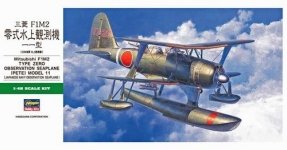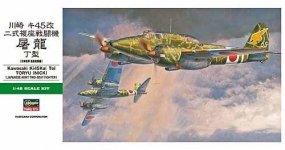Hasegawa SP407 The Magnificent Kotobuki Mitsubishi A6M3 Zero Fighter Type 32 `Naomi` 1/48
Skala 1:48
Plastikowy model samolotu do sklejania. Zestaw nie zawiera farb ani kleju.
Mitsubishi A6M Reisen (inne nazwy: Zero lub Zeke) to japoński, jednosilnikowy samolot myśliwski o konstrukcji w pełni metalowej w układzie dolnopłata z okresu II wojny światowej. Oblot prototypu miał miejsce 1 kwietnia 1939 roku, a wprowadzenie do służby w lecie 1940. Pierwsze prototypy były napędzane silnikiem Mitsubishi Zuisei 13, ale od modelu A6M2 model 11 wykorzystywano silnik Nakajima NK1B Sakae 12 o mocy 950KM, co uczyniło z samolotu jeden z najlepszych myśliwców wczesnego okresu wojny. Tuż przed wojną i w jej toku powstawały kolejne wersje. Jedną z najsłynniejszych był A6M2 model 21, przygotowany na początku wojny na Pacyfiku jego specjalna wersja ze skrzydłami składanymi przeznaczona dla lotniskowców, która stała się podstawowym japońskim myśliwcem pokładowym. Kolejne wersje to A6M3 oraz A6M5, z których każda miała kilka podwersji. W pierwszej z nich wykorzystano silnik Nakajima Sakae 21 o mocy 1130 KM ze sprężarką, co jednak oznaczało wzrost masy oraz spadek zasięgu i zwrotności. Problem ten starano się rozwiązać w wersji A6M5, poprzez zmianę układu wydechowego, zmianę kształtu skrzydła oraz zrezygnowano z ich składania, co sprawiło, że wzrosła prędkość maksymalna.
The Mitsubishi A6M Reisen (other names: Zero or Zeke) is a Japanese, single-engine, all-metal, low-wing fighter aircraft of World War II construction. The prototype was flown on April 1, 1939, and entered service in the summer of 1940. The first prototypes were powered by the Mitsubishi Zuisei 13 engine, but from the A6M2 model 11 onward, the 950-hp Nakajima NK1B Sakae 12 engine was used, making the aircraft one of the best fighters of the early war period. Just before and during the war, other versions were developed. One of the most famous was the A6M2 model 21, prepared at the beginning of the Pacific War, its special version with folding wings designed for aircraft carriers, which became Japan's primary deck fighter. Subsequent versions were the A6M3 and A6M5, each of which had several sub-versions. The former used an 1130 hp Nakajima Sakae 21 engine with a compressor, but this meant an increase in weight and a decrease in range and maneuverability. This problem was attempted to be solved in the A6M5 version, by changing the exhaust system, changing the shape of the wing and dispensing with the folding of the wings, which made the top speed increase.











 35 szt.
35 szt.

